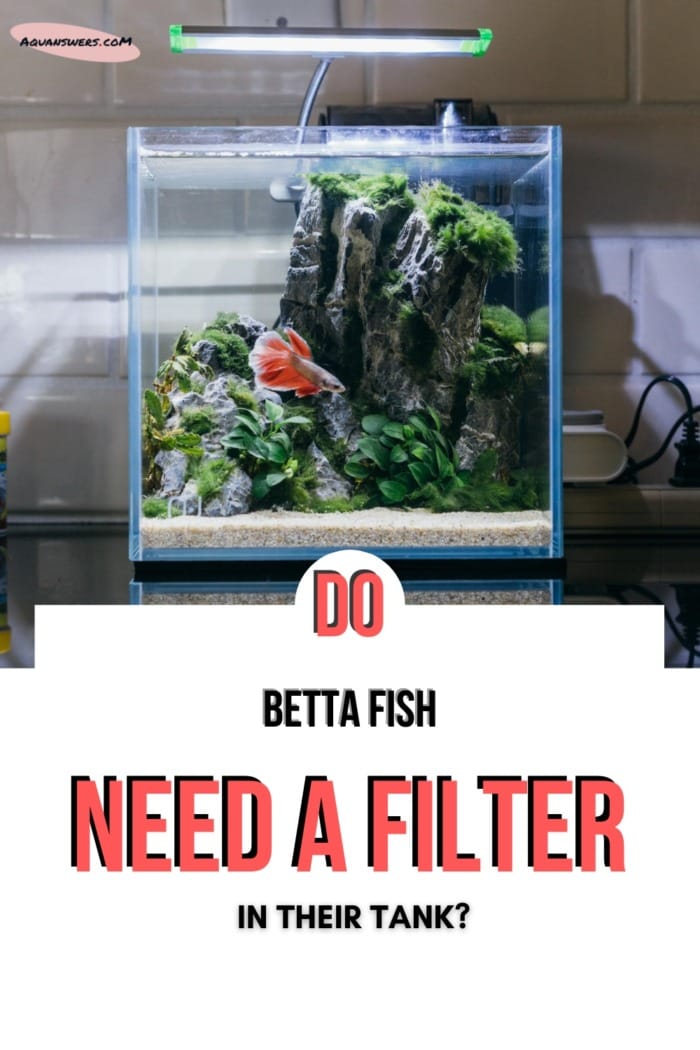You recently bought a betta fish but you’re starting to question if you did everything right and now a particular piece of gear has piqued your interest.
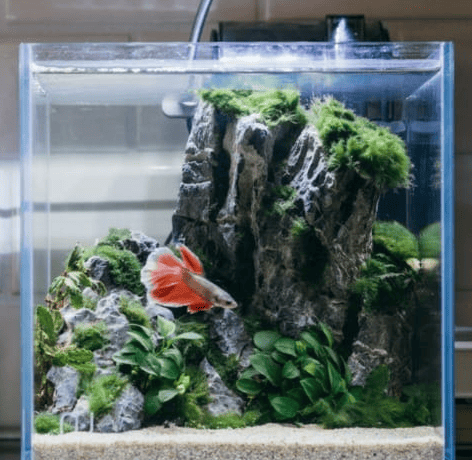
Do you really need a filter for a Betta if the pet store sells these fish in small unfiltered bowls?
Would the flow rate of the filter current prove too strong for a Betta’s massive fins?
Could a hardy Betta fish survive without an aquarium filter?
Let’s get straight to it.
Do Betta Fish Need a Filter in Their Tank?
Some people believe that Betta fish do not require a filter because they are supposedly hardy fish that can breathe air directly from the water’s surface.
However, a filter does more than just aerate the aquarium.
Here’s how aquarium filters help Betta fish:
Just like other animals, Betta fish excrete waste that, together with the uneaten fish foods, pollutes the water in their aquarium. If there is no filter in place to manage the waste by providing mechanical and biological filtration, the water in the tank may quickly become toxic to the Betta.
The result of unfiltered aquarium water may be a tortured life or premature death for your pet fish.
Therefore, the Betta is no exception and does require a filter installation in their fish tanks. If you’re still in the research phase of your aquarium journey you should probably read up on what else a fish tank needs.
Why is it Essential to Control the Waste in a Betta Tank?
When I just started keeping pet fish, I happily chose a Betta fish after I was told it would be easier to maintain, its homely beauty aside.
Everyone kept telling me that Betta fish are survivors.
This is true to an extent – Bettas can indeed survive in severe conditions.
Nevertheless, some people blow this out of proportion and no one really mentions that waste could build up quickly in small tanks.
As far as they are concerned, a betta is better off without any form of hygiene.
From where I sit, a betta in a jar is virtually a prisoner hoping for a prison break.
Here’s the myth:
Unlike many other kinds of fish that rely on their gills, Betta fish have the ability to suck in oxygen directly from the air.
They do this by swimming to the water surface periodically to fetch the oxygen in gulps.
Such fish are called Anabantoids and posses a lung-like organ called “Labyrinth”. As a pet, Betta fish use the same adaptation to survive in a bowl or an unfiltered aquarium.
For this supposed reason, these fish are thought to not need a filter (at least if we follow this line of thought).
And here’s a fact:
Any fish can survive 3 to 7 days in an unfiltered aquarium.
The fact that a Betta fish can survive in hell does not mean it wants its home to be a waste-ridden hell. For your Betta to thrive and show its attractive colors, it needs to live in an accommodative ecosystem with pure air and fresh food.
Some well-meaning but uneducated pet lovers also buy into this survivor-myth and inadvertently neglect to take care of their Betta fish, keeping them in small unfiltered tanks.
They also do not change the water until it develops a pungent smell.
However, this is not the newcomer’s fault as they weren’t given better advice in the pet store.
Plus, in small fish tanks, the water gets contaminated very quickly.
Perhaps, this is the most important role an aquarium filter plays in the well-being of fish.
These bacteria neutralize the waste of the Betta by converting it to non-lethal organic compounds. Said waste would otherwise degrade to toxic Ammonia or Nitrite in the aquarium water which quickly builds up to lethal levels for the fish unless lowered on time.
In smaller tanks where water volume is limited, it’s absolutely crucial to provide as much bed for beneficial bacteria as possible. That’s because the harmful chemicals can pollute the tank’s water in a matter of hours if there are not enough bacteria.
These bacteria mainly inhabit surfaces and the porous media in a filter provides plenty of that.
Allowing violent fluctuations in dangerous ammonia, produced by the degrading of fish waste, uneaten food, or rotting plant matter, is the most common mistake an entry-level fishkeeper can make.
This is often the cause of a slow and painful end to a Betta.
Without a filter, the symbiotic relationship between a Betta fish and beneficial aquarium bacteria hardly exists; the fish has to face the toxic by-products on its own.
Over time, such neglected Betta fish lose their colorful glow and vitality. They become mostly motionless, pale, sickly, and prefer to lie on the bottom much of the time.
It is also at this stage that their fins and tails start to deteriorate.
A rotting fin or tail is a telltale sign of a fouled aquarium ecosystem.
I’m speaking from my personal experience back when I was new to fish keeping.
The way out of this murky future is a filter to purify the water in your Betta’s aquarium.
How Fish Tank Size Impacts the Choice Of An Aquarium Filter?

Perhaps, now is the time to mention that if the tank where you’re keeping the Betta holds less than 3 gallons of water you should likely consider changing it to something bigger immediately.
Tiny tanks and bowls do not provide a Betta with a healthy living space. The fact that such-sized aquariums do not allow for adequate filtration greatly contributes to that.
If you’re still researching or you already have a fish tank that’s too small for your betta, I can help.
I did a super detailed post on the best aquarium kits for betta fish (which all include a built-in filter by the way) and it took me a whole week to put together. Visit the link if that’s your case.
Anyway, because a small aquarium already has limited space inside, fitting it with a submersible filter could complicate life for your Betta.
On the other hand, a powerful, submersible filter needs a giant aquarium that can absorb the currents.
This implies that a hang-on-back (HOB) unit would be a better option as a gentle water filter.
It will provide more swimming space for your fish pet while keeping the overall aesthetics of the aquarium.
Betta fish are famous for their large and beautiful fins. This makes it necessary, to consider a filter with an adjustable flow rate, however.
In other words, in a small fish tank with the size of 5 or fewer gallons a HOB filter may not be an adequate option.
For these small betta aquariums, a fitting solution would probably be a sponge water filter that’s not bulky in size.
As the Betta caretaker, you should aim at striking the right balance.
Can The Filter Current Prove To Be Too Strong For a Betta?
If the filter current’s strength is more than a Betta can handle, it soon gets tired and stressed. The Betta may then find it extremely hard to swim around with its large fins and has to hide or helplessly lay at the bottom instead
The strong water current can actually damage the fins of a Betta. With unfit fins, the Betta can easily drown.
So while a strong filter may not directly kill betta fish, it can gradually facilitate death through exhaustion.
The bottom-line cannot be overemphasized:
Whichever aquarium filter you go for, it should NOT have a high current output that interferes with the mobility of the Betta.
The solution to this is having an aquarium filter that has an adjustable valve that you can use to control the flow.
Otherwise, you could find your dear betta deadly exhausted.
Top Aquarium Filters for Your Betta: According To the Gallon Capacity of the Fish Tank
As I have already explained, smaller Betta aquariums need less powerful filters.
But how do you decide which filtration unit will do for your particular aquarium?
Here are the best water filters for a betta according to the fish tank’s gallons capacity:
Filtration For a 3 Gallon Betta Fish Tank
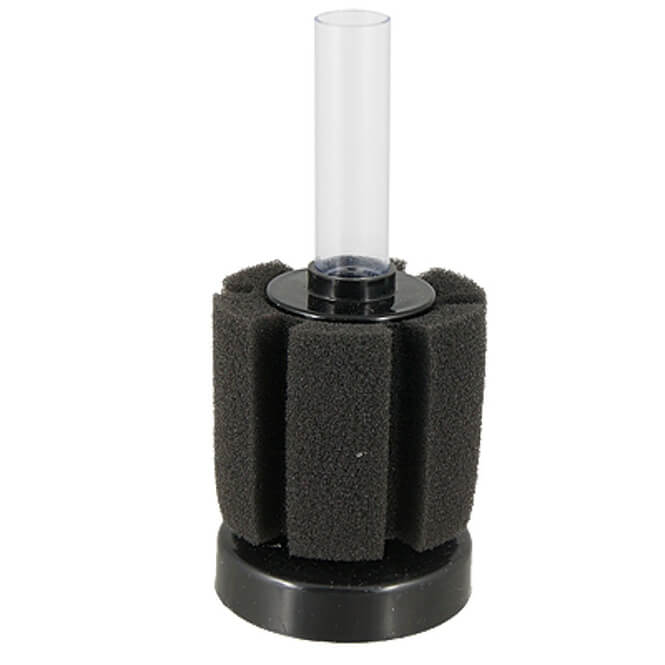
As a best option for a 3-gallon fish tank with a betta in it, the XINYOU XY-2835 Fish Aquarium Mini Cylinder is appropriate mainly because it does not produce much current. It guarantees both calm and clean water for your Betta in that limited space.
With water always clean, the betta will always look radiant and active.
The 3/4 inches filter is primarily a sponge.
The sponge is however too soft to harm the tender fins of a Betta and there’s no noticeable filter current.
The unit is also easy to clean; you just squeeze some of the old water out then clean the uptake tube.
Again, it is easy to set up and so suits a beginner.
Don’t forget to use dechlorinated water when washing the filter, to not kill the beneficial bacteria that are residing in it.
Filtration Unit For a 5 Gallon Betta Fish Tank
For a 5- or 5.5-gallon tank, you should still go for XINYOU XY-2835 Fish Aquarium Mini Cylinder. In a fish tank of this size, it is even quieter but still as effective in filtering the water.
It keeps the water crystal clear, enabling the Betta to enjoy swimming back and forth through the gentle bubbles. I really think this is the best water filter for the majority of fish kept in small aquariums and not just Betta fish.
The unit’s bottom is fitted with some weight to keep it on the tank bottom.
However, if the filter acts like it is going to float, give it a squeeze while it is submerged to fix the problem.
Filtration Unit For a 10 Gallon Betta Fish Tank
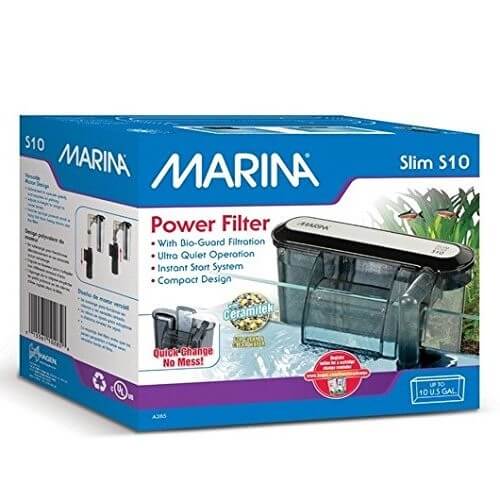
For a 10-gallon tank with a Betta, an adequate filtration system choice would be the Marina S10 Power Filter. I’m recommending this product as the best choice because it has a comparatively slim, compact, and elegant design that not only ensures it takes less space but also provides aesthetic benefits to your aquarium.
It is easy to set up and even easier to customize the media into it.
Just be careful not to replace all of the filter media once it’s time to change it.
Doing it will remove all of the beneficial bacteria and crash your nitrogen cycle.
Additionally, you should only use dechlorinated tap water when cleaning the media since chlorine is deadly to beneficial bacteria.
The best news for your betta is the cool adjustable flow rate that it provides.
It operates quietly, once its motor sinks in the tank water.
The betta can fearlessly swim through the gentle current.
There is a sponge over the intake to prevent the fins of your Betta from getting sucked in, just in case.
I’m positive that the Marina S10 really works in your pet fish’s best interest.
Filtration Unit For a 20 Gallon Betta Fish Tank
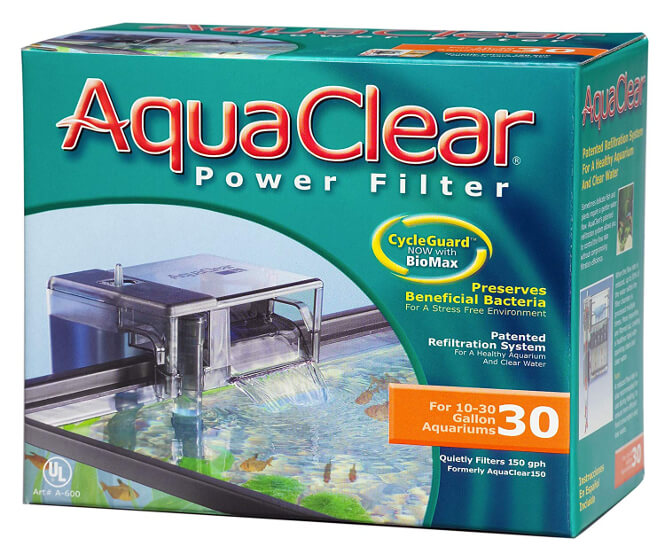
The AquaClear 30 Power Filter is one filtration unit that efficiently works for a 20-gallon aquarium with a Betta. First, its adjustable flow rate is a huge plus for a Betta.
Secondly, its filtration volume goes up to 7 times larger than other similar filters.
This is due to its multi-stage filtration system that efficiently provides a combination of biological and chemical filtration.
This ensures the water is super clean all the time, making this filter among the best choices for a betta aquarium of this size.
Furthermore, the additional layer of chemical filtration will help clear your aquarium from any medications you might have used to treat your Betta fish.
Moreover, all these processes occur without turbulence, for the benefit of your Betta and its fins.
The AquaClear 30 also establishes the symbiotic relationship between the fish and the beneficial bacteria that live on the filter’s bed.
It is also easy to clean and you do not have to remove the whole unit from the tank when doing so.
Does your Betta fish need a heater?
Even though Bettas can survive a wide range of water temperatures, they still have their preferences.
And since they’re tropical fish, they typically feel best in warm waters with a temperature between 75 and 80℉.
Keeping them outside this range will stress them and eventually lead to health issues.
Therefore, you should always use a heater when keeping a Betta fish, unless you live in a tropical region. And even then, having a heater can still be handy when there’s a sudden temperature swing.
Small heaters are generally more than enough for most betta tanks, but some setups call for bulkier ones. You can check this article to find the best heater based on your aquarium size.
My Conclusion
Evidently, Betta fish do need a filter for more than one reason, including a long healthy life.
It’s really best to provide yours with one for both your pet’s sake and yours.
Bettas look prettier when they live in an environment that guarantees good health because that promotes a more pronounced coloration.
They may endure hardship, but this would eventually take its toll on their well-being.
Be sure to drop me a comment if you need more guidance on the subject.
